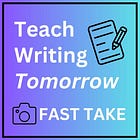✏️ Creative Writing Doesn't Exist
But neither does "creative music" or "creative art."
We Speak in Stories
Humans tell stories. Grouped with other truisms, we might say birds sing and cats mew. As time-bound creatures, we speak chronologically. From fables to fairy tales, myths to legends, diaries to histories, or parables to allegories—we tell stories. No, really: How was your day?
Consider this: Nobody lectures toddlers about plot. As I write, my toddler smacks his feet across the hardwood floor, book in hand, begging me to read Dr. Seuss. He may babble, but he sits dutifully and solemnly to hear stories three, four, or five times in a row. Hand the book to him and he hands it back.
We never outgrow stories. They impart, educate, and entertain. They form our pasts, prove our points, and project our futures. We message friends, read the news, watch movies, play video games, and more. Even sports reporting has evolved into documentary: perfect seasons, legendary games, inspiring backstories.
If schooling anchored the written word in the spoken word, writing would include some storytelling and communication. However, reality says we fill blank pages with something else, something far less natural.
Where do students spend their time writing at school, you ask? If not storytelling or messaging, what forms the default writing? The essay.
The Page as Worldview
In practice, students write exclusively for standardized tests—if they even write at all. The action exists for measurement. The implicit lesson teaches writing-as-punishment, the sentence as sentence. The written word itself mutates into punishment as students sit confined for hours on end, writing essays-on-demand during testing season.
Writing becomes Math-like. Thinking follows formulas, imposing universal mental models and conformity over curiosity. For paragraphs: restate, answer, cite, and explain. For essays: a thesis with three main points. Everything has an introduction, body, and conclusion. Since students never experience other mediums—no letters, no drama, no memoirs—all written expression means the essay.
Tested writing limits thinking rather than extending it. Five-paragraph thinking leads with the conclusion, forbidding invention or discovery. Our prewriting, a product of Current Traditional Rhetoric, stresses "BOWR": brainstorm, outline, write, and revise. We force these steps like orders of operation. We prefer mechanics over meaning. If writing is thinking, the page becomes worldview.
Tested writing suffocates. Their claustrophobic forms harm, not teach. They rob time without offering meaning. They hold no value beyond themselves or arbitrary scores. Teaching them teaches nothing. As hallways they lead to dead ends, fit for dancing cave shadows, nothing more. Go ahead, try explaining other mediums exist. Light blinds.
I'm not blaming my fellow teachers: We have our mandates. Policy becomes pedagogy. When teachers enter college, programs skip teaching writing entirely. (Along with phonics and basic classroom management.) When teachers enter classrooms, buildings enforce products rather than principles. When teachers enter administration, they spearhead consumption. It's a vicious cycle. Nobody truly learns.
Scripted teaching implies unknowable material. Teachers can't know their subjects, but they can read scripts. Corporations know all. So grab your sunglasses: All authority rests on corporate materials. Purchase and obey. Following with "fidelity" implies marriage, vows, and adultery for thinking otherwise.
Tested writing acts like a monoculture. Nothing else exists. In nature, industrial agriculture degrades soil and destroys biodiversity. Ecosystems crumble. In education, industrial farming of the mind degrades human potential. Society crumbles. In both, short-lived booms summon drought and dust.
Aside: Tested writing isn't exactly academic either. In academia, every convention from quotations to citations to style extends thinking across time like a conversation. In essentials, academic writing uses essays-as-letters, moving from inquiry to investigations to insight, authors responding to authors. Humanity needs academic writing! But five-paragraph thinking resembles neither letters nor research articles. Try a five-paragraph dissertation!
So if the default is "tested" writing, what do we call stories? Why, "creative" writing, of course!
Creative Music and Boring Writing
This “creative” writing distinction carries so many connotations: additional, extra, superfluous, nonessential. Useless. “Creative” justifies a taxonomy of exclusion. To true believers, only testing grants validity. It’s irrelevant whether communication itself is “creative.” It’s irrelevant whether tested writing applies elsewhere.
Notice we never call songs "creative music" or artwork "creative painting." Creativity is implied. We message into mediums, but the artistic mediums enrich our lives. They train the senses and pursue beauty. Emotions spill into song and dance while events memorialize as images.
Notice we also never praise tested writing as "boring writing." Being colorless, uninteresting, and droll is likewise implied. It's just "writing." The only writing. For many, just seeing limitations screams deviance and heresy. Tested writing acts liturgically with other religious notions like academic standards. So follow your standards with horse-blinders, practice dead-level abstracting, and never question.
Besides: Questioning isn't a standard.
And so the blank page never becomes the blank canvas. Schools teach disconnection: Speech never becomes text. Only one medium exists. Expression means song, dance, and drawing, but never writing. Novels move history like earthquakes, yet we disregard storytelling like finger painting. Take "creative" writing if your schedule allows.
Instead, every literate act exists within the grid of standards—political, prescriptive, and punishable. All learning must be measured like GDP. Nothing exists for its own sake. We banish the beauty from literature with Lexile levels and reading guides. Melville wrote Moby Dick for eleventh grade English, you guys. See the stamp?
Music or Just Notes?
Simply adding more stories misses the point. The error rests much deeper philosophically, I'm afraid. Fresh paint can't fix broken foundations. We need shovels and mirrors, excavation and reflection. Our policies create problems so simple, they're nearly invisible. Our premises lead to inescapable conclusions, yet we can't question cause and effect.
Wherein lies the issue? In short: Policy forces pedagogy to distort whole-part relationships.
Imagine teaching other things like we teach writing: History would feature people without events. Band would play notes and dynamics without playing music. Art would form lines without drawing pictures. Track would move arms and legs independently without running. And perhaps construction would start with roofs.
Sound absurd? Maybe so. Isolation always distorts complexity. Parts need wholes and context provides perspective. Most times, one plus one equals two, but other times, synergy rules. One plus one equals three. Isolation teaches at a loss. Grab a Linguistics book: Language is complex. Now grab a poetry book: Language is beautiful. Reconstructing complexity without context fails every time.
Let's focus on music: Music reduces to notes, yet musicians never play just notes. They play notes together. Playing just notes means never playing music. If you play just notes long enough, psychology takes over and music becomes unreachable. Ready for a crazy thought? Improving music means playing music.
Now translate this idea to writing.
Many English teachers claim the following: "I can't teach writing, I have to teach spelling. I can't teach writing, I have to teach grammar. I can't teach writing, I have to teach vocabulary." And so on. This sounds reasonable. By all means, teach spelling and grammar and vocabulary. (I do!) But divorced from writing, they're just notes. If improving music means playing music, then improving writing means actually writing.
As a shortcut, if isolation means distortion, tested-writing exists isolated from all other writing.
Consider the average rehearsal: Band directors don't need formal lesson plans or objectives to improve groups. Certainly no "I can" nonsense. Instead, musicians play through music and stop when they have trouble. They move from wholes to parts. The focus is descriptive, not prescriptive. Playing notes without music accomplishes nothing.
Now translate this idea to writing.
What if you only had thirty minutes to teach language? Prevailing wisdom says devote ten minutes each to spelling, grammar, and vocabulary. Maybe this might address student gaps? Then oops! No time for application. So why not start in application, write for ten minutes, then spend twenty in discussion and revision? Rather than pre-teach problems students may not face, addressing individual problems yields far greater return without the paperwork.
If teaching to actual problems seems controversial, we need to admit our directives are fundamentally flawed.
Principles over Programs
Philosophy determines marketing slogan. Follow tested-writing upstream and you'll find academic standards. The headwaters rise from the assumption we can legislate intelligence as numerical output. Once we decree every student the same, one-size-fits-all policy translates to product and pedagogy. Entire multi-billion dollar industries profit from this core assumption.
And just as Big Pharma prefers pills to nutrition, Big Textbooks and Big Testing prefer programs to principles. Subscribe forever. Independent, knowledgeable teachers help these companies no more than the healthy help the pill pushers.
Creative writing doesn't exist because educational policies imprison the written word. Tested writing smells like stagnant pond water. Until writing flows from speaking and spills into other mediums, reality demands aeration. We need a more simple design philosophy. We need integration, not isolation. We need principles, not products. We need permaculture of the mind.
Humans speak in stories—in creative writing. So what if we sourced writing from and around speech? What if we dropped the "pre" in pre-writing and students just wrote? What if we transformed ideas across mediums? What if writing-as-speech removed barriers? What if we began with interviews, letters, or drama and then moved to the essay?
What if we open-sourced language teaching?
Blank pages and ink will always cost money. Beyond that, however, improvement doesn't require fancy steps or software. It's far less linear or formal than people think. If we move beyond tested writing, if we ground writing in speech, the blank page as blank canvas opens new worlds for all. And for pennies compared to textbooks!
Again, I'm not advocating a stories-only approach. Just not a test-only approach. That’s it. Integrate other mediums. Begin writing in discussion then move to speech-oriented mediums before essays. Students act far less constrained thinking aloud to friends than beginning with convention-heavy essays.
English isn't like Math, but Music. As medium, the blank page exists like sheet music and marble. Only Art balances the simplicity and complexity of language. Only Art balances mechanics and meaning. Only Art balances parts and wholes, syntax and structure. And only Art invites writing as a lifetime pursuit, far beyond test scores and bells.
🎁 New to the blog? Check out my recent starter pack as well as a Google Drive Folder with FREE classroom resources! Also, The Honest School Times has your schooling satire.
🏆 Fan Favorites
✏️ Teach Writing Tomorrow
📓 Other Writing Tricks




